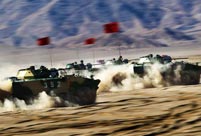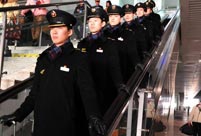 Cockfighting show staged in E. China's Heze during Spring Festival
Cockfighting show staged in E. China's Heze during Spring Festival
 Chinese New Year Flower Fair opens in San Francisco
Chinese New Year Flower Fair opens in San Francisco
 Festivities in Shanghai
Festivities in Shanghai
 PLA navy conducts drill in North China Sea
PLA navy conducts drill in North China Sea
 World's high-tech hotels
World's high-tech hotels
 Li Na poses with trophy on Brighton Beach in Melbourne
Li Na poses with trophy on Brighton Beach in Melbourne
 Six Chinese divers back safely after 300-meter saturation dive
Six Chinese divers back safely after 300-meter saturation dive
 Traditional wedding ceremony of Yao people
Traditional wedding ceremony of Yao people
 Taipei Game Show attracts geeky gamers
Taipei Game Show attracts geeky gamers
CLEAN AIR, CLEAR MINDS
When the International Olympic Committee was formed in Paris in 1894, few Chinese had any idea about what the Olympic Games were all about.
Today, Chinese people understand the Olympic motto, "faster, higher, stronger", chosen by Pierre de Coubertin, founder of the modern Olympic Games.
Host of the 2008 Summer Olympic Games, Beijing announced earlier this month a plan to bid for the 2022 Winter Olympic Games jointly with Zhangjiakou, 120 miles to the northwest of the capital.
The biggest challenge for Beijing might not be the increasing number of snow-free days but the notorious air pollution, product of uncontrolled industrialization.
The world's second largest economy reported 7.7 percent GDP growth in 2013, but growth is flagging and, as labor costs rise, poor natural resources no longer support growth at breakneck pace.
Apart from pollution, a gamut of problems--including irrational development, unbalanced economic structure and the gap between rich and poor--lie in wait.
The solutions require wisdom and determination.
The Chinese Communist Party (CPC) Central Committee has dubbed the 2014 "Jiawu" the first year of New Reform, and plan to release the country's entire potential, economically, socially and ecologically.
While combating all the problems may require teamwork, the latest champion may tell a different story.
Tennis star Li Na defeated Dominika Cibulkova at the Australian Open this weekend, claiming her second Grand Slam title.
Generally regarded as something of a rebel, Li did not thank her home country nor the national team she used to be with when she clinched her first Australian Open title. She was quoted as saying that she plays just for her own entertainment and happiness.
The Internet caught fire with debate about whether China should continue to train athletes following the so-called whole-nation system learnt from Soviet Union, or if Li Na, as an individual professional, is a better example.
"Faster, higher, stronger" may help people understand the truth behind sports, but people cannot expect an immediate answer to the argument. What they can expect is reform.


 3D film 'The Monkey King' premieres in Beijing
3D film 'The Monkey King' premieres in Beijing  Miss Chinese Int'l Pageant 2014 held in Hong Kong
Miss Chinese Int'l Pageant 2014 held in Hong Kong 'Golden Flowers' in the Spring Festival travel rush
'Golden Flowers' in the Spring Festival travel rush Li Na beats Cibulkova to win Australian Open
Li Na beats Cibulkova to win Australian Open Sexy models at Taipei Game Show 2014
Sexy models at Taipei Game Show 2014 'Living in ice house' competition held in central China
'Living in ice house' competition held in central China  Highlights of Chinese airborne troops'exercises
Highlights of Chinese airborne troops'exercises  All-male high speed train crew during Spring Festival travel rush
All-male high speed train crew during Spring Festival travel rush PLA navy drills in East China Sea
PLA navy drills in East China Sea President Xi visits border troops ahead of Lunar New Year
President Xi visits border troops ahead of Lunar New Year What do Chinese pack in their luggage in Spring Festival Rush?
What do Chinese pack in their luggage in Spring Festival Rush? Blind date fair in Hangzhou of Zhejiang province
Blind date fair in Hangzhou of Zhejiang province Film 'Where Are We Going, Dad' premiered in Beijing
Film 'Where Are We Going, Dad' premiered in Beijing  Australian Open champion Li Na returns to hometown Wuhan
Australian Open champion Li Na returns to hometown Wuhan Twin sisters serve during Spring Festival travel rush for the first time
Twin sisters serve during Spring Festival travel rush for the first timeDay|Week|Month